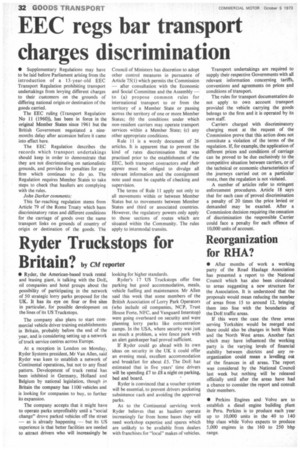EEC regs bar transport charges discrimination
Page 34

If you've noticed an error in this article please click here to report it so we can fix it.
• Supplementary Regulations may have to be laid before Parliament arising from the introduction of a 13-year-old EEC Transport Regulation prohibiting transport undertakings from levying different charges to their customers on the grounds of differing national origin or destination of the goods carried.
The EEC ruling (Transport Regulation No 11 (1960)), has been in force in the original Member States since 1961 but the British Government negotiated a ninemonths delay after accession before it came into effect here.
The EEC Regulation describes the records which transport undertakings should keep in order to demonstrate that they are not discriminating on nationalistic grounds, and provides for penalties for any firm which continues to do ,so. The Regulation requires Member States to take steps to check that hauliers are complying with the rules.
John Darker comments: This far-reaching regulation stems from Article 79 of the Rome Treaty which bans discriminatory rates and different conditions for the carriage of goods over the same transport links on grounds of country of origin or destination of the goods. The Council of Ministers has discretion to adopt other control measures in pursuance of Article 75(1) which permits the Commission after consultation with the Economic and Social Committee and the Assembly — to (a) propose common rules for international transport to or from the territory of a Member State or passing across the territory of one or more Member States; (b) the conditions under which non-resident carriers may operate transport services within a Member State; (c) any other appropriate conditions.
Rule 11 is a wordy document of 26 articles. It is apparent that to prevent the kind of rates discrimination that was practised prior to the establishment of the EEC, both transport contractors and their agents must be obliged to divulge all relevant information and the consignment note used must be capable of checking and supervision.
The terms of Rule II apply not only to all movements within or between Member States but to movements between Member States and third or associated countries. However, the regulatory powers.only apply to those sections of routes which are situated within the Community. The rules apply to intermodal transits. Transport undertakings are required to supply their respective Governments with all relevant information concerning tariffs, conventions and agreements on prices and conditions of transport.
The rules for transport documentation do not apply to own account transport provided the vehicle carrying the goods belongs to the firm and it is operated by its own staff.
Carriers charged with discriminatory charging must at the request of the Commission prove that this action does not constitute a violation of the terms of the regulation. If, for example, the application of different prices and conditions of carriage can be proved to be due exclusively to the competitive situation between carriers, or of the technical or economic characteristics of the journeys carried out on a particular route, then the regulation is not violated.
A number of articles refer to stringent enforcement procedures. Article 18 says that for each case of proved discrimination a penalty of 20 times the price levied or demanded may be exacted. After a Commission decision requiring the cessation of discrimination the responsible Carrier could face a penalty for each offence of 10,000 units of account.
















































































































































